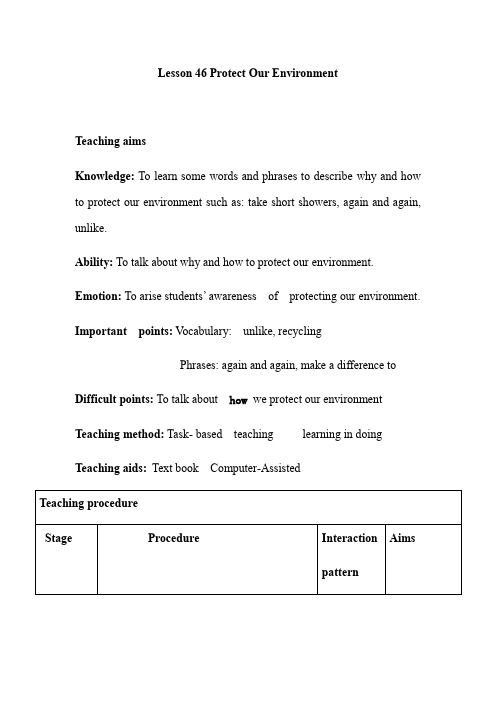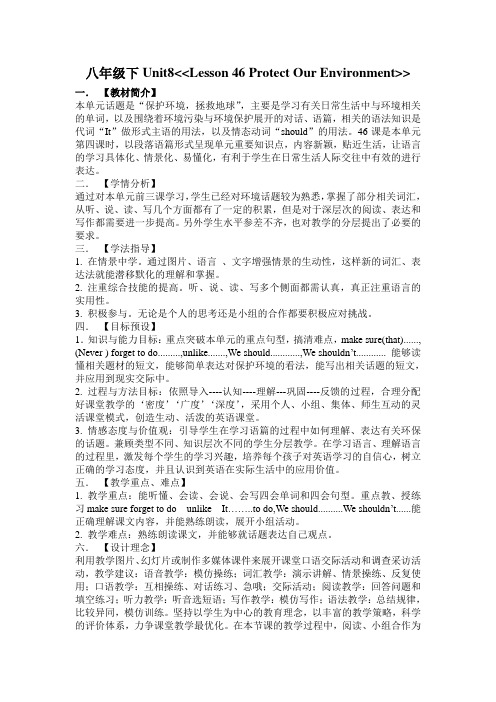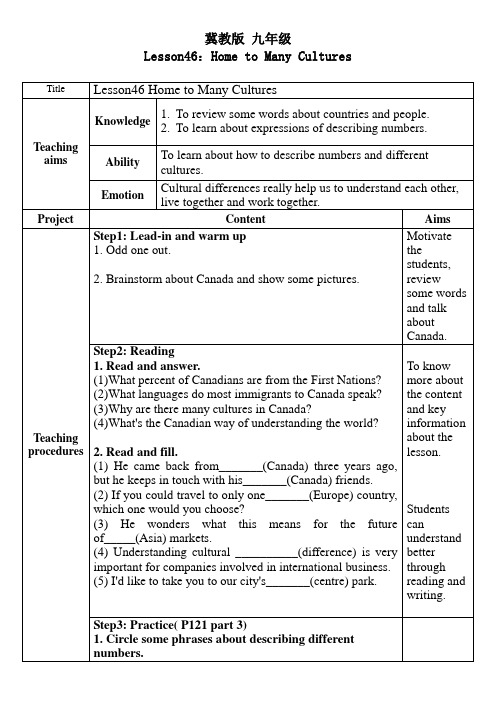Lesson 46
冀教版英语八年级下册Unit 8:Lesson 46 Protect Our Environment

Teaching procedure
Stage
Procedure
Interaction
pattern
Aims
Step1
Warming-up
T:Look atsomepictures, What can you see from them?
Phrases:again and again, make a difference to
Difficult points:Totalk abouthowwe protect our environment
Teaching method:Task- based teaching learning in doing
throw garbage on the ground
sort the waste before throwing it away
cut down trees in forests
turn off the tap when we are brushing our teeth
Group works
Let the Ss to know how totalk about the ways to protect our environment.
Group 2----to save water,we need to
Group3----to recycle,we need to
Group 4----to make less pollution,we need to
Group5----to make a big difference to our environment,we need to
Lesson46教案

Lesson46: Let’s go to the zoo!七年级英语杨丽I. Teaching Aims:1. To master the new words and phrases.2. To learn useful expressions of this lesson.3. Learn to know more about animals and to love animals II. Teaching Content:What is it?What are they doing?III. Teaching Key Point:New words: zoo, lion, elephant, monkey, lonelyThe elephant is dreaming. The lion is sleeping.IV. Teaching Difficulties:The Present Continuous Tense.V. Teaching Aids:Pictures, PPTVI.Teaching Methods:Reading,acting,practicingVII. Teaching Steps:Step One: Greeting and Daily Report.Step Two: Review.1.Numbers:TwentyThirtyFortyFiftySixtySeventyEightyNinetyOne hundredTwo hundred2.Plus+ minus- equal=3+4=713+8=2120+16=3610-8=247-22=2559-19=40Step Three: Presentation.1. Show the pictures and review animals we have learnt.2. Show the pictures and introduce the words zoo, lion, tiger, elephant, and monkey. Then say them a few times.3.Discussion.1. Are the animals happy in the zoo?No, they’re not happy.2. How do they feel?They are feeling lonelyStep Four: Practice.1.To learn the names of the animals.2.Exercise:A.1.eat(现在分词)____________2.get(现在分词)___________3.make(现在分词)___________4.lie(现在分词)______________5. monkey(复数)____________6.一头大象_______________B.1. What are you _____(do)now? I’m talking.2. Are they_____ (go) to the park now?3. Look! The students __________ (have)Breakfast.4. Listen! The boys ________ (sing) songs.5. The student ________ (work) on the computer.2.Read the sentences aloud.Step Five: Summary.1. Words and phrases: zoo, lion, tiger, elephant, monkey, lonely, dream2. Key sentences:1. Let`s go to the zoo.2. What is it?It is a…….3. What are they doing?They are …….4. The lion is lonely.Step Six. Homework.1. Learn the words and expressions by heart2. Finish off the exercises on page 46.3. Preview lesson 47.板书设计:Lesson46: Let’s go to the zoo!1.lion/ tiger/elephant/monkey2. What is it?It is a…….3. What are they doing?They are ……。
新概念英语第二册46课课件Lesson46

•
clothes “衣服” wear more clothes
•
Your clothes are very beautiful.
•
clothes 复数形式 ,谓语动词用复数形式。
•
clothing “衣服的总的称呼” “服装”
•
谓语动词是单数形式。
当一架来自伦敦的飞机抵达悉尼机场时, 工人们开始卸下装有服装的一批木箱.
account n.帐户
其中有只箱子特别重, 可谁也弄不清是怎么回事.
第21页/共34页
•
It suddenly occurred to one of the workers to open up the box.
He was astonished at what heccurred to sb. 某人想起某事
第20页/共34页
No one could account for the fact that one of the boxes was extremely heavy.
• account for = explain 说明…的原因、对…作出解释
• The bad weather in England accounts for Harrison ’s decision to leave the country.
• admit that…
承认…
• Sally admitted that she had used your dictionary.
• deny sth. /deny doing sth. 拒绝做…… [dɪ'naɪ]
• ② 准许…进入,准许…加入
• Without a ticket you won’t be admitted into cinema.
冀教版英语八年级下册Unit 8 Lesson 46 Protect Our Environment

八年级下Unit8<<Lesson 46 Protect Our Environment>>一.【教材简介】本单元话题是“保护环境,拯救地球”,主要是学习有关日常生活中与环境相关的单词,以及围绕着环境污染与环境保护展开的对话、语篇,相关的语法知识是代词“It”做形式主语的用法,以及情态动词“should”的用法。
46课是本单元第四课时,以段落语篇形式呈现单元重要知识点,内容新颖,贴近生活,让语言的学习具体化、情景化、易懂化,有利于学生在日常生活人际交往中有效的进行表达。
二.【学情分析】通过对本单元前三课学习,学生已经对环境话题较为熟悉,掌握了部分相关词汇,从听、说、读、写几个方面都有了一定的积累,但是对于深层次的阅读、表达和写作都需要进一步提高。
另外学生水平参差不齐,也对教学的分层提出了必要的要求。
三.【学法指导】1. 在情景中学。
通过图片、语言、文字增强情景的生动性,这样新的词汇、表达法就能潜移默化的理解和掌握。
2. 注重综合技能的提高。
听、说、读、写多个侧面都需认真,真正注重语言的实用性。
3. 积极参与。
无论是个人的思考还是小组的合作都要积极应对挑战。
四.【目标预设】1.知识与能力目标:重点突破本单元的重点句型,搞清难点,make sure(that)......, (Never ) forget to do.........,unlike.......,We should............,We shouldn’t............ 能够读懂相关题材的短文,能够简单表达对保护环境的看法,能写出相关话题的短文,并应用到现实交际中。
2. 过程与方法目标:依照导入----认知----理解---巩固----反馈的过程,合理分配好课堂教学的‘密度’‘广度’‘深度’,采用个人、小组、集体、师生互动的灵活课堂模式,创造生动、活泼的英语课堂。
3. 情感态度与价值观:引导学生在学习语篇的过程中如何理解、表达有关环保的话题。
(最新冀教版九年级)Lesson46:Home_to_Many_Cultures

冀教版九年级Lesson46:Home to Many Cultures Title Lesson46 Home to Many CulturesTeaching aims Knowledge1.To review some words about countries and people.2.To learn about expressions of describing numbers. AbilityTo learn about how to describe numbers and differentcultures.EmotionCultural differences really help us to understand each other,live together and work together.Project Content AimsTeaching procedures Step1: Lead-in and warm up1. Odd one out.2. Brainstorm about Canada and show some pictures.Motivatethestudents,reviewsome wordsand talkaboutCanada. Step2: Reading1. Read and answer.(1)What percent of Canadians are from the First Nations?(2)What languages do most immigrants to Canada speak?(3)Why are there many cultures in Canada?(4)What's the Canadian way of understanding the world?2. Read and fill.(1) He came back from_______(Canada) three years ago,but he keeps in touch with his_______(Canada) friends.(2) If you could travel to only one_______(Europe) country,which one would you choose?(3) He wonders what this means for the futureof_____(Asia) markets.(4) Understanding cultural __________(difference) is veryimportant for companies involved in international business.(5) I'd like to take you to our city's_______(centre) park.To knowmore aboutthe contentand keyinformationabout thelesson.Studentscanunderstandbetterthroughreading andwriting.Step3: Practice( P121 part 3)1. Circle some phrases about describing differentnumbers.Rise from...toDrop from...to(Try to use the phrases to describe numbers.) Practice makes perfect. Deal with the exercises and test the students' mastery about the knowledge.2. Hot seatImagine that you come from Canada, this is your first time to China. This is a good chance to talk with your Chinese friends.(About your nation, culture ,way of understanding or living habits)3. Report(1) List some Chinese traditional customs on the papers. Try to write some similarities and differences between Chinese and other cultures.(2) Time for Show!Choose the best report in groups.Choose the best report in class and show it.Practice their oral English and have a good understandi ng of the text.Have your own ideas about cultures and exchange your ideas with others. Practice their writing abilities and learn from each other.Step4: progress star and best wishes!To understand cultural differences really helps us to understand each other, live together and work together. Emotion promotion. Make students learn more about cultures.Home- work You can choose one!1. Write an e-mail about some similarities and differences between China and Canada.2. Give us a report about the cultural differences.Board DesignLesson 46 Home to Many Cultures Teamwork: ReviewRise from...to Group1: Canadian Drop from...to Group2: FrenchGroup3: ItalianGroup4: Germany......。
新概念第三册课文翻译及学习笔记【Lesson46、47、48】

【导语】新概念英语作为⼀套世界闻名的英语教程,以其全新的教学理念,有趣的课⽂内容和全⾯的技能训练,深受⼴⼤英语学习者的欢迎和喜爱。
为了⽅便同学们的学习,⽆忧考为⼤家整理了⾯的新概念第三册课⽂翻译及学习笔记,希望为⼤家的新概念英语学习提供帮助!Lesson46 【课⽂】 So great is our passion for doing things for ourselves, that we are becoming increasingIy less dependent on specialized labour. No one can plead ignorance of a subject any longer, for there are countless do-it-yourself publications. Armed with the right tools and materials, newlyweds gaily embark on the task of decorating their own homes. Men, particularly, spend hours of their leisure time installing their own fireplaces, laying out their own gardens; building garages and making furniture. Some really keen enthusiasts go so far as to build their own computers. Shops cater for the do-it-yourself craze not only by running special advisory services for novices, but by offering consumers bits and pieces which they can assemble at home. Such things provide an excellent outlet for pent up creative energy, but unfortunately not all of us are born handymen. Some wives tend to believe that their husbands are infinitely resourceful and can fix anything. Even men who can hardly drive a nail in straight are supposed to be born electricians, carpenters, plumbers and mechanics. When lights fuse, furniture gets rickety, pipes get clogged, or vacuum cleaners fail to operate, some women assume that their husbands will somehow put things right. The worst thing about the do-it-yourself game is that sometimes even men live under the delusion that they can do anything, even when they have repeatedly been proved wrong. It is a question of pride as much as anything else. Last spring my wife suggested that I call in a man to look at our lawn mower. It had broken down the previous summer, and though I promised to repair it, I had never got round to it. I would not hear of the suggestion and said that I would fix it myself. One Saturday afternoon, I hauled the machine into the garden and had a close look at it. As far as I could see, it only needed a minor adjustment: a turn of a screw here, a little tightening up there, a drop of oil and it would be as good as new. Inevitably the repair job was not quite so simple. The mower firmly refused to mow, so I decided to dismantle it. The garden was soon littered with chunks of metal which had once made up a lawn mower. But I was extremely pleased with myself. I had traced the cause of the trouble. One of the links in the chain that drives the wheels had snapped. After buying a new chain I was faced with the insurmountable task of putting the confusing jigsaw puzzle together again. I was not surprised to find that the machine still refused to work after I had reassembled it, for the simple reason that I was left with several curiously shaped bits of metal which did not seem to fit anywhere. I gave up in despair. The weeks passed and the grass grew. When my wife nagged me to do something about it, I told her that either I would have to buy a new mower or let the grass grow. Needless to say our house is now surrounded by a jungle. Buried somewhere in deep grass there is a rusting lawn-mower which I have promised to repair one day. 【课⽂翻译】 现在我们⾃⼰动⼿做事的热情很⾼,结果对于专业⼯⼈的依赖越来越少了。
冀教版英语八年级下Unit6Lesson46重点新词
Unit 6 ConnectLesson 46 Mothers and Fathers Are Special一、重点新词必备alive/ə'laiv/adj.having life,not dead,living活着的;仍存在的。
Are your parents still alive? 你的父母还在世吗?辨析alive,live,lively这三个词都可以作形容词,表示“活着”,但含义不同(1)alive是表语形容词,可以指人亦可指物,反义词为dead,不可置于名词前。
Was the tiger alive or dead? 这只老虎是活着还是死了?(2)live作定语,用于修饰物而不修饰人,可以置于名词前。
Look! Tom is playing with a live mouse.看! 汤姆在玩一只活老鼠。
(3)lively活泼的;活跃的;生动的。
Mr.Zhang always tries to make her class lively and interesting.张老师总是设法把课堂变得生动有趣。
hero/'hiərəu/n.someone who is admired for their bravery,goodness,or great ability,esp.someone who has performed an act of great courage under very dangerous conditions英雄。
其形容词形式为heroic,意为“英雄的;英勇的”。
hero的复数形式为heroes。
a real hero of the match这场比赛中的真正英雄care/kεə/n.& v.the process of looking after someone or something that needs attention;to be worried,concerned about关心;担心。
冀教版英语七年级下册 Lesson 46 课件
........
Post-reading
Listen and help Betty finish her summer plan.
听听力,帮助Betty完成暑假计划。
Post-reading
Speaking: make your own summer plan.
Post-reading
Exercise for key points: fill in the blanks with the correct forms of the given words.
1. They ___________ (go ) to school tomorrow. 2. He ___________ ( leave ) the house at 8:00 am every day. 3. She ___________ ( go ) to work on weekdays. 4. Jenny ___________ ( watch ) a movie next Tuesday evening. 5. We __________ ( play ) basketball together the day after tomorrow. 6. I _________ ( listen ) to the English radio program every morning.
learn something
new
summer holiday
eat ice cream
do more exercise
play sports
While-reading Scan and fill in the blanks扫读并填空.
冀教版八年级英语下册Unit6 Lesson 46优课件
III. 根据所给汉语意思,翻译下列句子,每空 一词。 1. 我们会照顾你的花。 We'll __ta_k_e__ __c_a_r_e_ ___o_f __ your flowers. 2. 并不是所有的鸟都会飞。 __N__o_t _ __a_l_l __ birds can fly. 3. 你是怎样庆祝父亲节的? How did you c_e_l_e_b_r_a_te_ _F_a_t_h_e_r_'s_ __D_a_y__?
(3) live通常作前置定语,且一般用于动 物。意为“活的;现场直播的;实况 的”。 如:
Only a few live trees were left after the fire. 火灾之后只剩下几棵树还活着。
1. On Father's Day, fathers can do whatever they want! 在父亲节那天, 父亲们可以做他们任何想做的事情!
New words
Listening
Think About It !
When is Mother’s Day? How do people celebrate it?
What about Father’s Day? How did Mother’s Day start?
Language Points
(2) living既可用作表语形容词,又可用作 定语形容词,故可放在它所修饰的名词之 前作定语。作比喻义时,意为“活生生 的”。也可作名词,意为“生活”。如:
Her grandfather is still living at the age of 93. 她爷爷已经93岁了,仍然健在。 He earns his living by growing flowers. 他以种花为生。
九年级英语下册Lesson46教材内容详解冀教版
Lesson 46:Get a Good Education 接受良好的教育◆课文英汉对照THINK ABOUT IT! 想一想!●Which of these would you most like to have: a car, a house or a good job?这些中哪个是你最想拥有的:一辆小汽车,一栋房子还是一份好工作?●Do you think a good education is important? Why or why not?你认为一种良好的教育重要吗?为什么重要或为什么不重要?●What’s Jack Hall’s advice for Danny?杰克·霍尔给丹尼的建议是什么?Date: May 24日期:5月24日Weather: Warm! Time to plant the garden!天气:暖!是在花园里种植的时候了!Dear Diary,亲爱的日记本,This evening, I had a meeting with Jack Hall, th e Canadian astronaut. He’s very nice and今天晚上,我同加拿大宇航员杰克·霍尔见面了。
他是一个非常好的handsome, too! We talked for over an hour.人。
我们谈了一个多小时。
I asked him how he grew up to be an astronaut. He laughed, and said that he had always我问他是怎样长大成为一名宇航员的。
他笑了,并且说他一直计划着去遨游太planned to visit space.空。
To get ready, he studied science and mathematics all through school. After he graduated from 为了准备,他在整个上学过程中都学习自然科学和数学。
